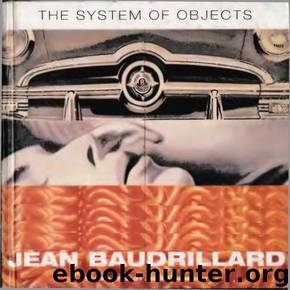System of Objects, The by Jean Baudrillard

Author:Jean Baudrillard
Language: eng
Format: mobi
Published: 0101-01-01T00:00:00+00:00
I Models and Series
The Pre-Industrial Object and the Industrial Model
The status of the modern object is dominated by the MODEL /SERIES distinction. To some extent, things were ever thus. A privileged minority in society has always served as a testing-ground for successive styles whose solutions, methods and artifices were then disseminated by local craftsmen. All the same, one cannot exactly speak of 'models' or 'series' in connection with any time before the industrial era. For one thing, there was a far greater homogeneity among all objects in pre-industrial society, because the mode of their production was still everywhere handcraft, because they were far less specialized in function, and because the cultural range of forms was more restricted (there being little reference to earlier or to extraneous traditions); furthermore, there was a much tighter segregation between the class of objects that could lay claim to 'style' and the class of locally produced objects that had use value only. Today a farmhouse table has cultural value, but just thirty years ago its sole value arose from the purpose it served. In the eighteenth century there was simply no relationship between a 'Louis XV' table and a peasant's table: there was an unbridgeable gulf between the two types of object, just as there was between the two corresponding social classes. No single cultural
system embraced them both.1 Nor can it be said that a Louis XIII table is the model of which the countless tables and chairs that later imitated it are the serial form.1 2 A limited dissemination of craft techniques did occur here, but there was no dissemination of values: the 'model' remained absolute, for it was bound to a transcendent reality. No serial production in the modem sense could be based on it. The social order was what gave objects their standing. A person was noble or not: nobility was not the ultimate - privileged - term in a series but, rather, a grace that bestowed absolute distinction. In the realm of objects the equivalent of this transcendent idea of nobility is what we call the 'style' of a period.
This distinction between pre-industrial 'period' objects and the 'models' of today is a very important one, because it allows us to get beyond the purely formal opposition and clarify the concrete relationship between model and series in our modem system.
Considering that broad strata of our society do in fact live among serially produced objects that refer formally and psychologically to models which only a small minority can enjoy, there is a strong temptation to simplify the problem by positing a polarity between the former and the latter, and then assigning the value of reality to just one of the poles: to separate series and model completely so as neatly to assign one to the real and the other to the imaginary realm. Unfortunately, the everydayness of serial objects is not unreal as compared with a putative world of models as true values, nor is the sphere of models imaginary just because it affects but a tiny minority, and thus might seem to fall outside social reality.
Download
This site does not store any files on its server. We only index and link to content provided by other sites. Please contact the content providers to delete copyright contents if any and email us, we'll remove relevant links or contents immediately.
The remains of the day by Kazuo Ishiguro(8999)
Tools of Titans by Timothy Ferriss(8396)
Giovanni's Room by James Baldwin(7346)
The Black Swan by Nassim Nicholas Taleb(7129)
Inner Engineering: A Yogi's Guide to Joy by Sadhguru(6796)
The Way of Zen by Alan W. Watts(6614)
The Power of Now: A Guide to Spiritual Enlightenment by Eckhart Tolle(5782)
Asking the Right Questions: A Guide to Critical Thinking by M. Neil Browne & Stuart M. Keeley(5775)
The Six Wives Of Henry VIII (WOMEN IN HISTORY) by Fraser Antonia(5515)
Astrophysics for People in a Hurry by Neil DeGrasse Tyson(5190)
Housekeeping by Marilynne Robinson(4447)
12 Rules for Life by Jordan B. Peterson(4304)
Ikigai by Héctor García & Francesc Miralles(4274)
Double Down (Diary of a Wimpy Kid Book 11) by Jeff Kinney(4272)
The Ethical Slut by Janet W. Hardy(4253)
Skin in the Game by Nassim Nicholas Taleb(4249)
The Art of Happiness by The Dalai Lama(4130)
Skin in the Game: Hidden Asymmetries in Daily Life by Nassim Nicholas Taleb(4007)
Walking by Henry David Thoreau(3962)
